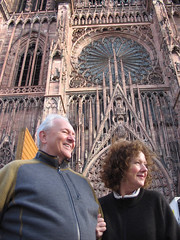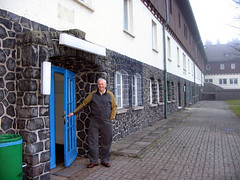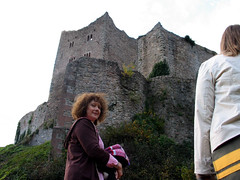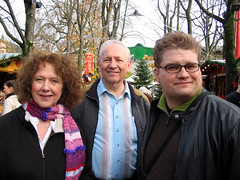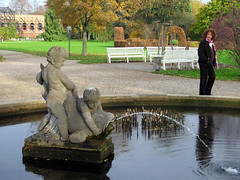Christmas in Germany: Part 1
We LOVE Christmas time in Germany! It is our FAVORITE place to be at Christmas! We let our families know before moving here that they were not to expect us home for the holidays...we were not going to pass up this opportunity to spend Christmas in Germany!
By mid- to late-November Germans start preparing for Christmas. The first real sign that the holiday is finally upon us is the opening of the Weihnactsmarkt...the Christmas Market.
Every German city and town has a Christmas Market. Somewhere in the center of town, often around an old church, little wooden booths are set up and vendors sell all kinds of good things: Christmas decorations, candles, and handmade crafts. You'll also find yummy food...like chocolate or wurst with bread or warm drinks like Glühwein (a warm red wine with spices, or the non-alcoholic version for children of warm red grape juice punch with spices). Often, markets also have music performers or merry-go-rounds for kids. The market is typically open daily through December and it is especially lovely in the evenings, with Christmas lights all around the market.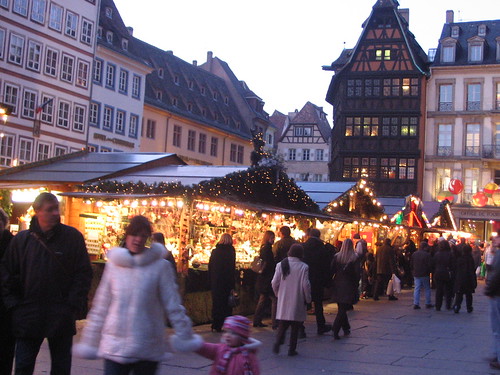
My other favorite thing about Christmas here, are the traditional decorations:
Räuchermännchen ...the name means "little smoking men" and they are little men made from wood. You place a little cone-shaped peice of incense to burn inside him, and curls of smoke drift out of his mouth. Charming! Click here for an example.
Schwibbogen...these are decorative wooden arches that hold candles. They are usually placed on window sills. Click here for an example.
Nussknacker...or Nutcrackers, are of course well-known to you all. But click here if you need an example.
Pyramiden...these are my favorite! Named for their pyramid-like shape, these wooden decorative carousels hold candles at their base. The heat from the candles turn the propellers at the top, which turn the decorative figures on the pyramid. It's just not Christmas without a pyramid! Here's an example.
Although these decorations are well-established German traditions...you will find them in EVERY German home...they all originate from one small, specific region of Germany: the Erzgebirge (or Ore Mountains) found on the Czech border.
And then there's my other favorite thing about Christmas in Germany...St. Nikolaus Tag (St. Nicholas Day)! This is like a little pre-Christmas Christmas. On the evening of December 5th, all the children shine their shoes then leave them outside their bedroom doors. During the night, St. Nikolaus comes and gives candy and nuts and little toys to all the good boys and girls enjoyed by them the next morning, December 6th, St. Nicholas Day! This is what he looks like.
Some other important days before Christmas in German are the Advents...each of the four Sundays before Christmas are the advents. Each advent a candle is lit in anticipation of the coming of the Christ child: on the first advent, one candle is lit, on the second two candles are lit, the the third...you get the idea. Often Germans will celebrate each advent by eating Lebkuchen and drinking tea or coffee. You can read more about this tradition here.
But one of my favorite things about Christmas in Germany is that it lasts for THREE DAYS! The most important day of Christmas for the Germans is Christmas Eve (December 24th) or Heilige Abend (Holy Evening). On this evening, the family gathers for a simple humble meal (often sausages and potato salad) which symbolizes the humility of Christ's birth. Then the gifts are opened. Santa Claus...or the Weihnachtsmann (Christmas Man) isn't usually as generous as he tends to be in the US. Gifts are meaningful but not necessarily plentiful. I've also learned that in this region of Germany, which is strongly Catholic, many Germans receive their gifts from the Christkind...or Christ Child. The Weihnactsmann tradition really comes from the United States image of Santa Claus. But the Christkind represents Christ as a child. The Christ child is represented by a young woman with golden curls and an angelic robe. Here's an example. After Heilige Abend, Christmas continues on the first day of Christmas (December 25th) and the second day of Christmas (December 26th) with lots of big meals and family gatherings.
Karl and I hope all of you have a wonderful Christmas! We miss all of our friends and family at this special time of year, and we wish we could be with all of you...but rest assured we are loving our traditional German Christmas!
(By the way...if you have any questions about these or other German Christmas traditions, or if you have any Christmas traditions you'd like to share...please feel free to leave a comment!)
(And if you're interested in adding some wonderful wooden German Christmas ornaments to your holiday, here's a good place to start. Or for more information on German Christmas traditions and ornaments click here.)
